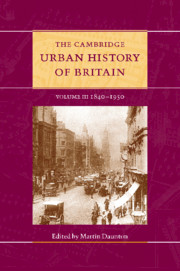Book contents
- Frontmatter
- 1 Introduction
- Part I Circulation
- Part II Governance
- Part III Construction
- 14 Patterns on the ground: urban forms, residential structure and the social construction of space
- 15 Land, property and planning
- 16 The evolution of Britain’s urban built environment
- 17 The planners and the public
- Part IV Getting and spending
- Part V Images
- Select bibliography
- Index
- Plates 1-7
- Plates 8-14
- Plates 15-20
- Plates 21-27
- Plates 28-34
- Plates 35-41
- Plates 42-48>
- Plates 49-53
- References
17 - The planners and the public
from Part III - Construction
Published online by Cambridge University Press: 28 March 2008
- Frontmatter
- 1 Introduction
- Part I Circulation
- Part II Governance
- Part III Construction
- 14 Patterns on the ground: urban forms, residential structure and the social construction of space
- 15 Land, property and planning
- 16 The evolution of Britain’s urban built environment
- 17 The planners and the public
- Part IV Getting and spending
- Part V Images
- Select bibliography
- Index
- Plates 1-7
- Plates 8-14
- Plates 15-20
- Plates 21-27
- Plates 28-34
- Plates 35-41
- Plates 42-48>
- Plates 49-53
- References
Summary
In the current literature, it is often asserted that the planning system which emerged in mid-twentieth-century Britain was remarkably and regrettably undemocratic. Planners had long wished to impose their own idiosyncratic ideas and now found themselves legally entitled to do so. Ordinary people’s wishes were ignored, as common sense was jettisoned in favour of dogma. The schemes that resulted won plaudits in professional competitions but were rarely liked by the public. In the long term, some believe, this ‘reform from above’ actually exacerbated the urban decay and social deprivation it set out to alleviate. Many would no doubt instinctively sympathise with Lady Thatcher’s robust declaration at the 1987 Conservative Conference that planners were culpable: they had ‘cut the heart out of our cities’.
In the following chapter, we scrutinise some of the basic historical components of this pervasive view and show that they are far too simplistic. Town planners in Britain had always meditated on the question of public participation, even if their solutions were sometimes vague or actually ambiguous. Moreover, the planning system created by Labour after the Second World War was relatively open and allowed – often encouraged – involvement from ordinary citizens. Planners and planned, it is true, did not always coexist happily under the new legislation, but this was not because the former simply ignored the latter. To understand the problems that developed means, in our view, admitting into the analysis factors that are frequently ignored, particularly the question of finance, the local government milieu in which planning occurred and the precise configuration of real (as opposed to assumed) popular thinking about the urban environment at this time.
- Type
- Chapter
- Information
- The Cambridge Urban History of Britain , pp. 525 - 550Publisher: Cambridge University PressPrint publication year: 2001

